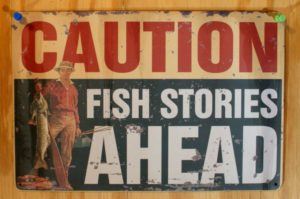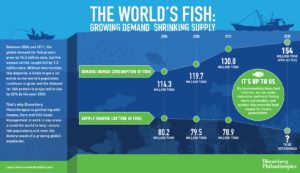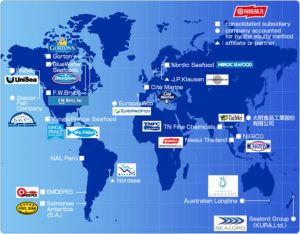Food security under climate change. GO FISH?

Among our best answers -yet- to address climate change in the food industry is managing marine ecosystems by restricting, if not closing, the high seas for fishing. .. wait, what?
 I remember my mom used to talk a lot about sustainability while I was growing up. We would go on the company’s fishing boats and she would say :
I remember my mom used to talk a lot about sustainability while I was growing up. We would go on the company’s fishing boats and she would say :
“This won’t always be this way.. resources are not infinite and you need to be mindful of that, it will be the challenge of your generation” Well, I did not fully grasp what my mom meant back then and certainly today it took me a while to fully understand what sustainability really meant in the food industry. So here’s a definition I really like: ” It is understanding how actions affect future generations and making sure we do not deplete all of our resources ” [1]
So what is the fishing industry exactly and why does it matter.. at all? First, the export value of world trade as of 2014 was US$ 148 billion. From seafood exports, 54% came from developing countries. Also, around 12% of the world’s population relies on fisheries and aquaculture for they livelihoods. [2]
Last, this global industry sector provides 2.9 billion people with 20% of their animal protein needs [3]
Climate change has made a tremendous impact on the industry as oceans are drastically changing and the marine ecosystems are experiencing massive variations . Among this conditions, there is temperature,salinity, sea ice extend, oxygen levels and circulation. What does this represent for the fi shing industry?
shing industry?
* Changes in primary and secondary productivity
* Change in distribution of species (due to water temperature and salinity)
* Timing of biological events [4]
Important fact —> scenarios with high emissions (meaning changes in the ocean’s temperature greater than 2 degrees warming) would reduce the industry’s revenues by 10% and scenarios with low emissions ( ocean warming of 2 degrees or less) would represent a 7% decrease in revenues [5]
A research conducted by the University of British Columbia proposed management of ecosystems as a way to build climate change resilience. They came up with three management scenarios[6] :
- Closing the high seas for fishing (high seas are areas of the ocean that are outside jurisdictions of any country and cover nearly two thirds of the ocean surface)
- Seeking international cooperation to manage/cap fishing
- Maintaining status quo (each country/company self regulates its catch quotas)
SCENARIO 1 turned out to be the best possibility.
This theory rose a particular interest in one of the largest fishing industry incumbents :
Nissui: Nippon Suisan Kaisha
Nissui is based in Japan, It is one of the largest in the world with global operations that include 61 subsidiaries and 44 associate companies across the world. [7]
It was surprising to me that Nissui would be interested in adopting such a measure for sustainable oceans. I believe that there are many issues that companies and governments need to address in order to be able to implement such management of the ecosystems as a way to cope with climate change.
I do want to discuss the operational and political impact of such iniciative.
Because high seas are outside any country’s jurisdiction, I wonder if this initiative could be undertaken by countries as a sustainability approach in this industry or by all means needs to be a private initiative? Second, from an operational stand point this would mean that there needs to be a massive shift in the global supply chain of seafood, specially at the sourcing. Are companies in favour of closing the high seas for fishing the ones that actually have the infrastructure to move to farm fishing, as is the case of Nissui? Because if there is no possibility of sourcing from the ocean, the immediate step would be moving to farming… how exactly will that benefit all the informal small fishing companies in emerging countries?
None the less, it is an initiative that should be taken in consideration and for doing so there are a few things that I believe Nissui needs to do in order to push this initiative forward.
- There needs to be some monitoring or collection of information about how the fish species behave once catch quotas are limited or drawn to zero.
- There must be a way to trace the supply chain and how the demand is being sourced exactly. Since they are a global player, it is a great opportunity to obtain information in different geographies.
- Identify -from within their infrastructure- if they are ready to alleviate the increase in demand for farmed fish
Only after this isolated trial would Nissui be able to predict if limiting high seas catch would provide a positive and sustainable outcome not just for the marine ecosystems but to all aspects impacted by such a change.
(word count: 767)
- Mazzetta Company, LLC. Responsibility and Sustainability Report http://www.mazzetta.com/PDFsub/Corporate_Responsibility_Report_compressed.pdf#page=14
- Marine Stewardship Council, The Seafood Economy. https://www.msc.org/healthy-oceans/the-oceans-today/the-seafood-economy
- Secure sustainable seafood from developing countries, www.sciencemag.org/lookup/doi/10.1126/science.aaa4639
- Cheung, W. W. L., Jones, M. C., Lam, V. W. Y., D Miller, D., Ota, Y., Teh, L. and Sumaila, U. R. (2016), Transform high seas management to build climate resilience in marine seafood supply. Fish Fish. doi:10.1111/faf.12177
- Vicky W. Y. Lam et al, Projected change in global fisheries revenues under climate change, Scientific Reports (2016)
- Fujita R, et al. Managing for a resilient ocean. Mar. Policy (2012), http://micheli.stanford.edu/pdf/
- Nissui http://www.nissui.co.jp/english/




Interesting. I’m also curious how they propose to enforce closing the high seas. The UN Convention on Law of the seas gives a country 12NM of territorial waters and then 200NM of Exclusive Economic Zone(EEZ) after that 12NM. It would require a lot of coordination to enforce a measure to close the high seas to fishing. I’m not sure it can be done with the limited resource and other priorities that most nation’s Navies face today. Furthermore, if a single nation refused to to enforce this, it would give them a competitive advantage and basically unlimited resources. Do you think it could actually be done?
Thank you Alan, I don’t think this could be done. I was extremely surprised that companies such as Nissui would be even contemplating such strategy to reduce the impact on ocean warming, but again they are one of the few companies with the infrastructure to shift to 100% farmed fish. As it is right now I feel this iniciative has the structure of the Kyoto protocol and such level of commitment I find hard to comply with- as you have mentioned anyone not enforcing it would have a massive competitive advantage- specially with a 140 billion dollar industry that affects a significant portion of global population -specially emerging markets- where people are not just economically but socially affected. There must be a better idea, but I understand the pressure to do something is high so I feel governments and NGOs are going with the best they have in hand right now.
Angelica, interesting article, but I completely agree with Alan. I don’t think closing the high seas for fishing is doable to begin with. Moreover, not sure who would be responsible for surveilling compliance since by definition no party has jurisdiction. Also, all of the solutions involve some form of capping supply & demand, which in a market economy I do not think is sustainable in the long term. The other alternative you mention is to migrate to farm fishing, which carries its own set of problems, including (1) significantly lower quality of protein and instead higher fat content because fish cannot swim freely; (2) potential health issues given fish are highly concentrated in a tank and therefore more prone to develop diseases (personally I heard already occurred in multiple shrimp and salmon firms); and (3) limited to a number of species since not all fish types are capable of reproducing under captivity.
My question is whether we have another alternative, a long term solution perhaps involves some form of technology. I have no idea what such technology would look like but I think it come in either of two ways: (i) cleaning or making oceans more suitable again for fish to live and reproduce; and/or (ii) making farm fishing better quality and more accessible. Are you aware of any technological advances in that front?
Thank you Andrés! I’m actually 100% with you on every concern you have. Technological advances in farmed fishing have gained more strength in the past two decades and they come from many fronts.. anything from controlling and understanding the interaction of bacteria, nutrients and cultured species to improved thermodynamics applied to the pond and tank design. In Colombia, I was part of a project held by private companies and the government to farm a species called Cobia which was not natural to our EZZ but natural to similar tropical areas. Not even with every tool in terms of technology out there was the project able to succeed, one of the critical reasons being the varying temperature in the water. That being said, plus your concerns on health, quality and the variety of species,.. if farming is the answer, we are not quite there yet to supply the growing demand for fish in the world.
Here is the thing though. Two months ago this made the US headlines:
“Will Obama fence off more of the ocean? US fishermen are fearful ”
American fishermen are deeply fearful that the Obama White House could cut them off as early as this week from major fishing areas of the U.S. continental shelf on both coasts, further restricting one of the most highly regulated fishing industries in the world.
http://www.foxnews.com/politics/2016/09/13/will-obama-fence-off-more-ocean-us-fishermen-are-fearful.html
Further more on Sept. 15 the OUR OCEAN ONE FUTURE conference took place in Washington, DC where world leaders came together to discuss among many other things… closing the high seas for fishing. So my concern really is not if it is happening or not -because it looks like we are slowly headed that way- but how on earth are we going to cope with the economic, political and social consequences of such initiative.
Here’s the website with the agreements for 2016
http://www.state.gov/r/pa/prs/ps/2016/09/262042.htm
What the fishermen fear most is the kind of unilateral action by the White House that they have already seen elsewhere. As part of their ongoing environmental ambitions, the Obama administration’s Council on Environmental Quality, and the president himself, are aggressively interested in creating preservation zones that would ban fishing and other activities within large portions of the 200-mile U.S. “exclusive economic zone” of maritime influence, and just as interested in getting other nations to do so, in their own as well as international waters.
http://ourocean2016.org/#event
http://www.foxnews.com/politics/2016/09/13/will-obama-fence-off-more-ocean-us-fishermen-are-fearful.html
Hi Angelica. While I wait for my invitation to go cruising on your company’s boat, I’ll comment on your thought-provoking piece. Open seas fishing is a quintessential “tragedy of the commons” microeconomics dilemma. I agree with the other commenters that it will be difficult for Nissui to voluntarily stop fishing the open seas. They’ll just increase their costs while offering customers farmed fish, an alternative that many view as inferior to wild caught fish.
I think your comment about the Obama White House cutting off all access to major fishing areas may be a better solution. When there’s an environment encouraging players to take advantage of such huge externalities, you often need government to fix the situation. I assume that the US government’s decision to seize massive swaths of land to create the federal parks system was heavily disputed many years ago. Today however, most view the move as a prescient decision that saved some of America’s most beautiful landscapes.
Hi Angelica, thanks for a really insightful post. I am always fascinated by countries approach to their marine economy. I wonder though whether closing down fishing would have some adverse side effects, and question whether this would be a carbon neutral activity. Fish represents one of the largest cheapest sources of protein for much of the developing world. Should they switch to chicken or beef, what would be the next carbon impact? In addition, these are some of the poorest people in the world, depriving them of a stable source of protein could have quite significant impacts on their nutritional intake. Surely there are groups of people globally better able to soak up a supply side shock to their consumption bundle?